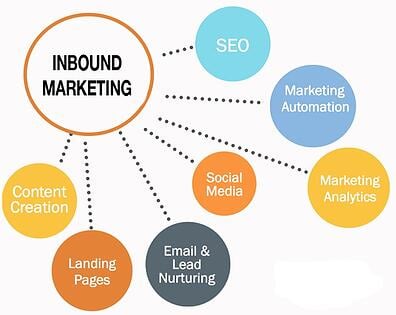It’s probably too late to call inbound marketing the wave of the future. It’s already here and everybody’s doing it. Well, to clarify, that means your indirect sales partners are doing it—or, at least, they want to be doing it. If your company is a manufacturer that markets its products through a network of independent dealers and resellers, your partners’ success is your success.
Defining Inbound Marketing
Inbound marketing is the practice of attracting customers to your brand by providing them with valuable content; rather than trying to convince them to buy your products or services through traditional means (advertising, direct mail, cold calling, etc.). You can establish your brand’s credibility by providing information (usually online) that will help prospective customers understand and solve their problems. If you have a company blog where you or someone else at your company share thoughts about your industry and other relevant topics, you’re doing inbound marketing.
Inbound marketing is a valuable resource because:
- It creates informed buyers
- It generates solid leads that are ready to buy
- It reaches prospects they would never be able to reach through conventional means
- While traditional advertising and outbound marketing techniques are dying, inbound marketing is thriving
SEE ALSO: Increase the ROI of Your Inbound Marketing Strategies
Inbound Marketing in the Channel
- As inbound marketing becomes more important, manufacturers need to become more active in generating leads and distributing them to their partners. There are number of reasons for this. Among them, your partners may lack the resources to invest in inbound marketing themselves. Often, sales partners have few employees, none of whom have the time to create content on a consistent basis or coordinate an inbound marketing campaign.
- Inbound marketing should be coordinated across the channel. Just as different partners marketing the same products to the same customers causes channel conflict—and drives prices and profits down—different partners competing against each other, or your company, for attention online will result in conflict. You wouldn’t want your partners stealing your online leads any more than they would want you stealing theirs.
- It's imperative to centralize and organize your content. That doesn’t mean your partners shouldn’t have input into the messaging of your inbound marketing campaign. As we have written before on this blog, collaboration between channel partners and manufacturers is one of the keys to success in the indirect sales channel. Your partners deal with end users every day. They know what their customers are asking about, what they’re struggling with, and what they like and dislike about your products. That’s the kind of information you need to create strong inbound marketing content.
- A good partner relationship management (PRM) system is necessary for doing inbound marketing right across the sales channel. Your PRM should allow you to:
- Collaborate with your sales partners, soliciting and receiving their input on content creation.
- Distribute inbound marketing leads to your sales channel partners, basing your distribution on metrics like partner performance.
Inbound Marketing Can Grow Your Business
Inbound marketing will not only help you generate more leads for your indirect sales channel, it will also help you attract high-quality channel partners. Investing in the channel and maintaining though leadership is impressive to vendors and potential partners. It's time to start investing, so check out our Channel Blueprint Guide below!

Image: https://www.inboundauthority.com/seo-inbound-marketing/.

